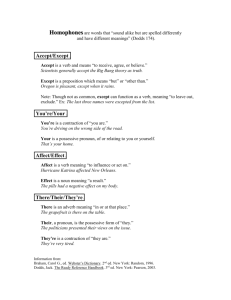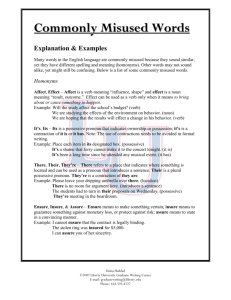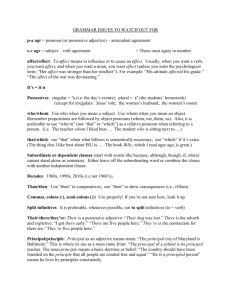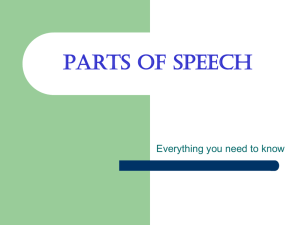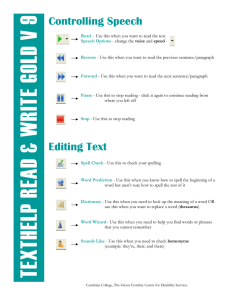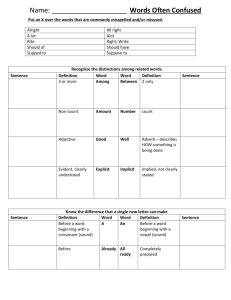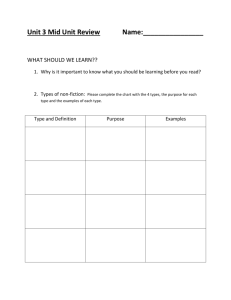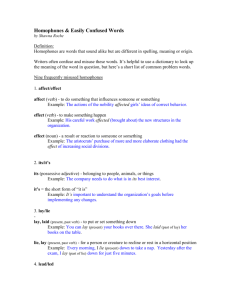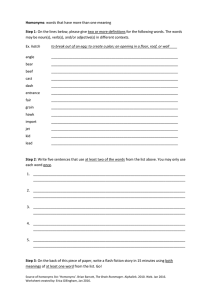Commonly Misused Words
advertisement
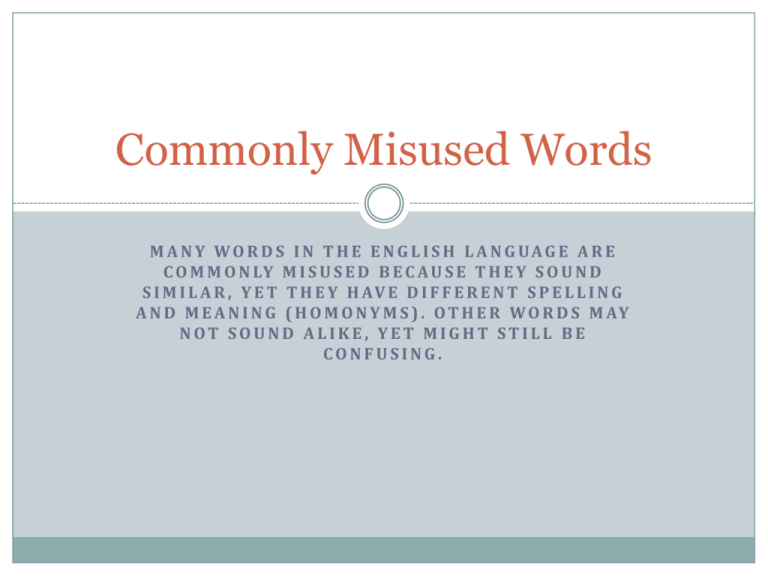
Commonly Misused Words M A N Y WO R D S I N T H E E N G L I S H L A N G UAG E A R E C O M M O N LY M I S U S E D B E C A U S E T H E Y S O U N D S I M I L A R , Y E T T H E Y H AV E D I F F E R E N T S P E L L I N G A N D M E A N I N G ( H O M O N Y M S ) . O T H E R W O R D S M AY NOT SOUND ALIKE, YET MIGHT STILL BE CONFUSING. Homonyms Affect, Effect – Affect is a verb meaning “influence, shape” and effect is a noun meaning “result, outcome.” Effect can be used as a verb only when it means to bring about or cause something to happen. Example: Will the study affect the school’s budget? (verb) We are studying the effects of the environment on behavior. (noun) We are hoping that the results will effect a change in his behavior. (verb) Accept, Except – Accept is a verb that means to receive; except is a preposition that means excluding. Example: John will accept his award during the ceremony. Everyone will be in attendance except his father. Homonyms Ensure, Insure, & Assure – Ensure means to make something certain; insure means to guarantee something against monetary loss, or protect against risk; assure means to state in a convincing manner. Example: I cannot ensure that the contract is legally binding. The stolen ring was insured for $5,000. I can assure you of her sincerity. There, Their, They’re – There refers to a place that indicates where something is located and can be used as a pronoun that introduces a sentence. Their is a plural possessive pronoun. They’re is a contraction of they are. Example: Please leave your dripping umbrella over there. (location) There is no room for argument here. (introduces a sentence) The students had to turn in their proposals on Wednesday. (possessive) They’re meeting in the boardroom. Homonyms Council, Counsel – A council is group of people that assembles for discussion; counsel means advice or guidance. Example: The council met twice every month. He obviously did not want any legal counsel. Compliment, Complement – Compliment means a statement of praise; complement means to go well with or perfect something else. Example: The customer sent his compliments to the chef. The picture complements the design perfectly. Homonyms Allusion, Illusion – Allusion is an indirectly made reference. Illusion is a misconception or false impression. Example: He made several allusions to the poem in his paper. John was under no illusion about his new job; he knew exactly what to expect. Principle, Principal – Principle means rule or standard. Principal refers to a person who holds a high position or plays an important role; it also an adjective that means chief or leading. Example: The school principal will be resigning next year. He has a principal reason for resigning. He has always refused to compromise his principles. Homonyms Elicit, Illicit – Elicit means to bring out, draw out, or evoke. Illicit means illegal. Example: Nothing the teacher said could elicit a response from the child. He is in jail for illicit drugs. It’s, Its – Its is a possessive pronoun that indicates ownership or possession; it’s is a contraction of it is or it has. Note: The use of contractions needs to be avoided in formal writing. Example: Place each item in its designated box. (possessive) It’s a shame that Jerry cannot make it to the concert tonight. (it is) It’s been a long time since he attended any musical event. (it has) Homonyms Emigrant, Immigrant – An emigrant is one who leaves one’s native country to settle in another; an immigrant is one who enters and settles in a new country. Example: The emigrant spent four weeks aboard the ship before it landed in LA. It is very hard for immigrants to find jobs. Other Confusing Words That, Which – That usually introduces as essential phrase that is not set off by commas; which introduces a non-essential phrase that is set off by commas. Example: This is the room that we were looking for. (essential) The old car, which I’ve had for years, has finally broken down. (not essential) Comprise, Compose – The whole comprises (or includes) the parts; and the parts compose (or make up) the whole. Example: The United States comprises fifty states. Organic compounds compose the fertilizer used by the farmer. Lie, Lay – Lie means to recline or rest on a surface; its principal parts are lie, lay, lain. Lay means to put or place; its principal parts are lay and laid. Example: I was so tired after work I had to lie down for a short time. I laid the files on the desk.
